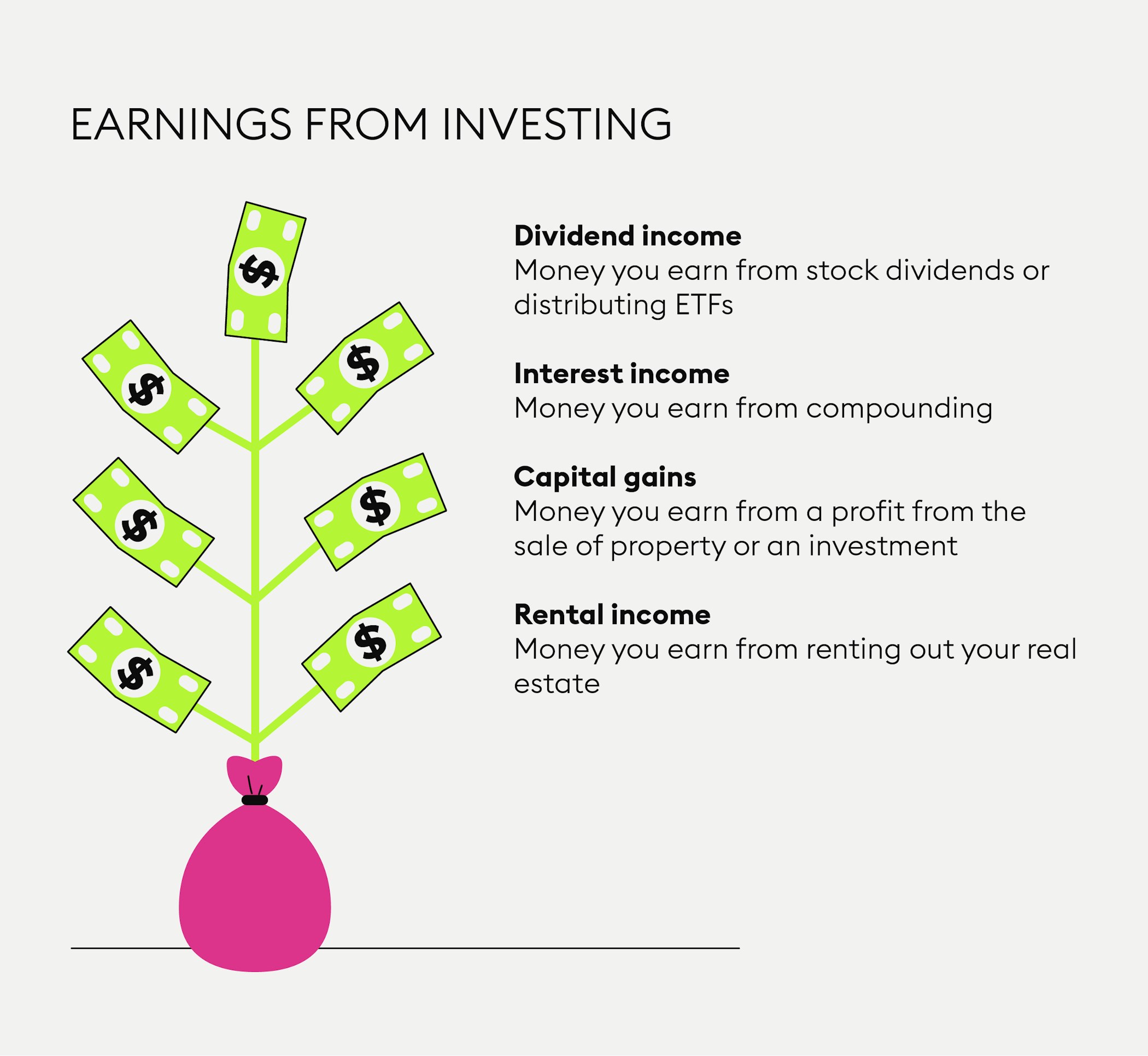
How do investments earn you money?
Investors buy shares and invest in assets in the hopes of making a profit in the future by either growing their assets or earning an income through dividends and compound interest.
People invest money to make gains from their investments.
Investors may earn income through dividend payments and/or through compound interest over a longer period of time.
The increasing value of assets may also lead to earnings.
Generating income from multiple sources is the best way to make financial gains.
*Please note: Depending on where you live, income from investing is subject to national legislation and taxation. This article pertains to investing in European countries.
How to earning money from dividends
One way investments generate income is through dividends. If you have invested in a company by buying shares, for example, that company may pay you a small proportion of its earnings to its shareholders in return. Such a payment is called a dividend. In addition, shares from a publicly-traded company will likely rise in value in line with the positive performance of the company.
How to earn dividends from individual stocks
If you want to earn dividends from individual company stocks in your portfolio, there are several things you need to consider before you buy shares.
If you only buy shares in a small number of companies, this strategy may not offer enough diversification. By not spreading your investments over different assets, you may be increasing your risk - similar to putting “all your eggs in one basket”.
Furthermore, if you are investing your money in stocks of just a few companies, you also need to take the time on a daily basis to closely monitor the companies that you have invested in. For instance, if you are investing in a company that produces goods that depend on resources from other markets, such as steel, you should also be keeping an eye on how global steel prices are developing, for example.
Also, there are broker fees and conditions as well as taxation issues to consider that may be more complex when dealing with individual shares. Finally, you’ll want to educate yourself on the taxation of your assets which depends on taxation laws in the country where you live. It’s a good idea to inform yourself before you invest and to consult your tax advisor when needed.
How to earn dividends from distributing ETFs
Investing in funds such as an exchange-traded fund (ETF), which is made up of multiple stocks or assets, may significantly reduce investment risk compared to investing in individual stocks thanks to diversification. Diversification means that you spread your investments - and thus the risk - across a range of different asset types.
Investors can choose between “distributing ETFs”, which regularly distribute dividends, and “accumulating ETFs”, which reinvest dividends. So if you are looking for your assets to generate regular income, then you should look into investing in distributing ETFs that regularly pay out dividend income.
How to earn money from compounding
Compound interest is the money investors earn on the interest generated by their investments. Compounding means that the interest generated by an asset will generate further income over the course of time if reinvested continually.
The rule of 72
One way to calculate how long it will take you to double your investment with compounding is by applying the “rule of 72”. Let’s say the fixed annual interest for an investment is 3%. You divide 72 by 3 and the result is 24, meaning that it will take 24 years to double the capital you invested if you leave your returns to compound.
This calculation shows you how low interest rates - along with the threat of inflation - may adversely affect your funds, like what you keep in a savings account. When interest rates are low, your investment will only generate very little income at a very slow pace.
New to Bitpanda? Register your account today!
Sign up hereHow to earn money with cost averaging
To ensure steady gains from your assets, investing your money in a range of different investment vehicles may help you to reach your financial goals. It does not matter how small the amount is that you want to invest - on Bitpanda you can start investing from as little as €1.
A great way to get started in investing is to take advantage of cost averaging by making investments in an asset of your choice with a sum of your choice at regular intervals, like you can with Bitpanda Savings.
How to earn through asset appreciation
Another reason to invest in an asset is expecting that it will increase in value over time, allowing you to make a profit when you sell the asset after it has appreciated.
Earning with real estate
A very basic example of asset appreciation would be buying real estate. If you buy property in an area that is just beginning to grow and flourish, you can make a profit from selling it after its value goes up. If you set up a business on your property, you may also generate income from the business. Finally, if you buy an apartment, not only do you profit from it increasing in value over time, you can also generate additional earnings by renting the apartment out to tenants.
DISCLAIMER
This article does not constitute investment advice, nor is it an offer or invitation to purchase any crypto assets.
This article is for general purposes of information only and no representation or warranty, either expressed or implied, is made as to, and no reliance should be placed on, the fairness, accuracy, completeness or correctness of this article or opinions contained herein.
Some statements contained in this article may be of future expectations that are based on our current views and assumptions and involve uncertainties that could cause actual results, performance or events which differ from those statements.
None of the Bitpanda GmbH nor any of its affiliates, advisors or representatives shall have any liability whatsoever arising in connection with this article.
Please note that an investment in crypto assets carries risks in addition to the opportunities described above.
